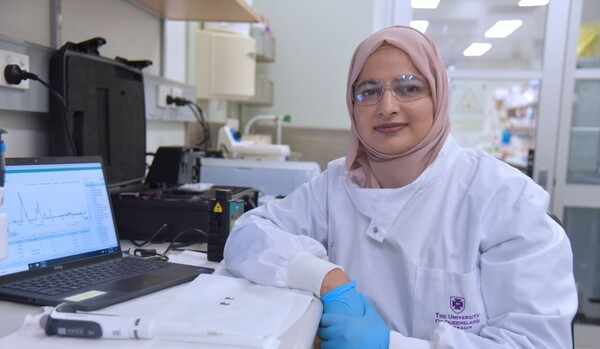A University of Queensland PhD student is pioneering the use of sponge-like gold particles to make ovarian cancer diagnosis more accurate, less invasive, and potentially accessible for women in remote communities.
Javeria Bashir, from UQ’s School of Mechanical and Mining Engineering, has developed specially designed gold nanoparticles that act as tiny light amplifiers, revealing cancer markers in patient samples such as blood, urine, or saliva.
Her goal is to improve survival rates for a cancer often diagnosed too late. “Ovarian cancer rarely shows clear symptoms in its early stages, and diagnosis is often complex,” Ms Bashir said. “Current approaches make it difficult to accurately triage and identify women with ovarian cancer compared to those with benign conditions, often requiring painful and invasive procedures such as tissue biopsy. To me, this creates an unacceptable situation for women. At present, there is no effective and accessible test to accurately identify ovarian cancer and prevent women from undergoing unnecessary procedures.”
Working alongside experts from UQ’s Australian Institute for Bioengineering and Nanotechnology, the Centre for Clinical Research, and the Centre for Extracellular Vesicle Nanomedicine, Ms Bashir turned to the unique biosensing properties of mesoporous gold nanoparticles.
Using a technique called Surface-Enhanced Raman Scattering (SERS), she was able to significantly boost the sensitivity of gold-enhanced light sensors. “SERS platforms are already highly sensitive and can detect biomarkers at the nanoscale,” she said. “Using mesoporous gold nanoparticles increased that sensitivity even further compared to nonporous, or commercially available nanoparticles. Essentially, the gold particles act like tiny light amplifiers, creating hotspots that reveal even the faintest traces of cancer.”
The diagnostic approach combines a simple tube for the patient sample with a handheld Raman spectrophotometer. In trials, it outperformed current blood tests, achieving 82 per cent sensitivity in confirming ovarian cancer and 98 per cent specificity in ruling it out.
For Ms Bashir, the potential goes beyond clinical accuracy. The technology’s portability and affordability could make a difference for women who might otherwise face barriers to testing. “This project demonstrates how mesoporous nanotechnologies can help us transform disease monitoring and pave the way for personalised treatment strategies,” she said. “Devices like this are moving closer and closer to everyday use.”
The research was published in the journal Small, with contributions from the Mater Research Institute and Oregon Health and Science University. Ms Bashir worked under the supervision of Associate Professor Md Shahriar A. Hossain, Dr Mostafa Kamal Masud, Professor Yusuke Yamauchi, and Professor Carlos Salomon, who provided conceptual and clinical guidance.
As ovarian cancer continues to rank among the most challenging diseases to detect early, gold-based nanosensors may soon offer a less invasive and more reliable way to triage women, opening the door to faster treatment and better survival outcomes.
